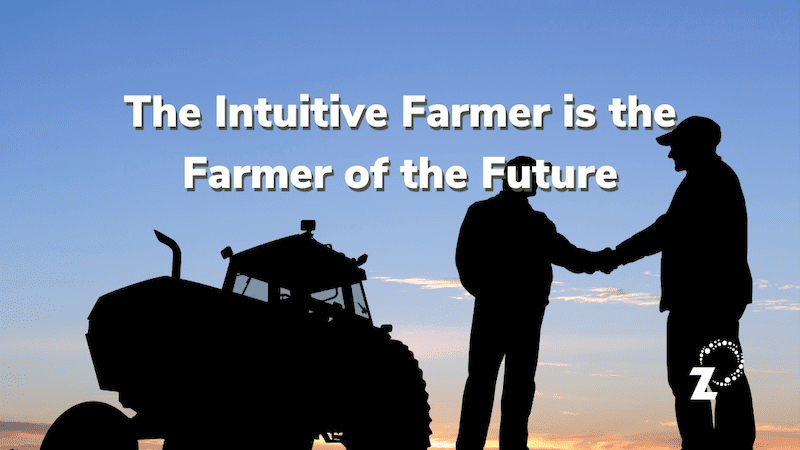We need better knowing, not more knowledge
The modern focus on scientific and intellectual farming approaches has significantly advanced food production. Innovations such as fertilisers and machinery have enabled food production to keep pace with a booming population, and advancements in the preservation of food results in access to a greater variety of food all over the world. However, in this drive to produce more and more food, acknowledging and remedying the impact of these activities on nature’s balance and natural resources have largely been neglected.
The industrial, technological approach to farming works on a never-ending treadmill of interference: pesticides and herbicides reduce beneficial soil microbes and organic matter →
plants cannot optimally take up and use naturally available nutrients in the soil → farmers use more synthetic fertilisers → leading to degraded, acidified and compacted soil → poor soil quality causes unhealthy plants to become diseased → farmers apply more pesticides and herbicides… and the cycle continues. It’s no secret that a large proportion of agricultural soil health is severely degraded, and we need to farm more sustainably if we want to feed our futures. I would argue that instead of basing management decisions on a purely rational and cognitive approach, farmers need to harness (and trust) their unique intuition.
What is intuitive decision-making?
Intuitive decision-making refers to people making decisions naturally (using gut feel), without the use of formal tools and procedures. It is a fast, involuntary and sensitive process that seems to bypass the brain’s functional cognitive processes, while taking prior knowledge and experience into account.
Modern mainstream agricultural research, on the other hand, takes a rational approach to generate empirical, tangible knowledge for increased yields, regeneration and sustainability. While helpful in supporting farmers’ decision-making to a degree, these technological tools fail to factor in the more complex, dynamic variables.
Several scientific studies indicate that farmers do not often use formalised, cognitive decision support tools to make practical management decisions; many prefer to rely on their intuition, resulting in both qualitative and quantitative benefits. Farmers often work off gut feel, which becomes more reliable as they learn what works on their specific farms. I have found that I learn more from farmers than from lectures, consultants, and peer-reviewed scientific papers. What I’ve seen in over 30 years of working with farmers is that farmers who farm ‘intuitively’ report numerous beneficial outcomes, such as:
- Earlier disease detection
- Lower chemical inputs
- Increased nutritional value of crops
- Longer shelf-life of products
- Higher input efficiency in plant production
- Lower use of antibiotics
- Lower veterinary costs
- Improved immune responses
- Efficient feed conversion rates
- Minimised impact on the surrounding environment
Although the role of intuition in decision-making has long been studied and debated in research fields such as neurobiology, psychology and psychiatry, the use of intuition in an agricultural context has received little attention in scientific research. However, I believe that intuitive decision-making could have significant implications for modern management decisions in South African agriculture, especially when it comes to improving farm efficiency and transitioning to regenerative farming.
Anyone who has worked closely with farmers will know that challenges to farm management are more complex and site-specific than can be accurately represented by standardised scientific models and analytical methods. Thus, farmers must often rely on their intuition and access to tacit knowledge that offers insight into holistic, customised solutions. Although intuition is natural and involuntary, it’s also informed by the science, teachings and experience that they have gleaned along the way. This puts them in a unique position to inform their unique understanding and management of their local environments.
For example, instead of dumping bags and bags of Nitrogen (N) fertiliser on crops in the hopes of a better yield, an intuitive farmer may pick up that these fertiliser applications are having a negative effect on soil microbes. All soils, microbes and fertilisers are unique, and different environments have varying interactions between these elements—interactions and variables that may not be listed in a scientific journal or textbook. So, using their inherent decision-making and intuition, a farmer may choose to employ task-specific microbes and biostimulants that will facilitate the solubilisation of fixed nutrients from decades of inorganic fertiliser applications.
As we enter a new era of food production, the challenge is not to simply produce more food, but to optimise human health, ensure the protection of our food chain, and sustain life on our planet. Farmers are increasingly pressured to make management decisions that are both efficient and ecologically sound, and I encourage them to complement analytical processes with their own intuition, which is often more accurate to their circumstances and more closely connected to nature. Plus, it’s free and easily accessible!
Farmers that embrace the regenerative route will, after digesting all the information on the topic, be able to choose their own path, most suited to their budget, risk profile, and gut feel.
One of Zylem’s unique strengths is the ability to work with distributors to manufacture farm-specific or region-specific products that use farmers’ unique knowledge to facilitate the switch from conventional to regenerative agriculture. You can email Justin at Justinp@zylemsa.co.za.

About the Author: Alex Platt
Alex is Business Development Manager at Zylem. He’s inspired by the potential of regenerative farming and takes a special interest in the technology and products that are moving agriculture in a more sustainable direction.

